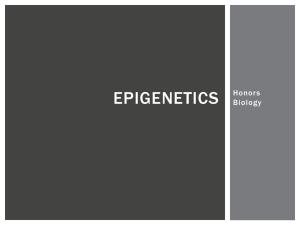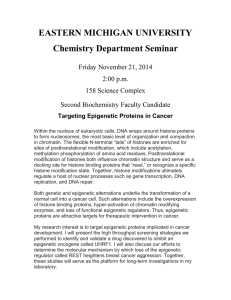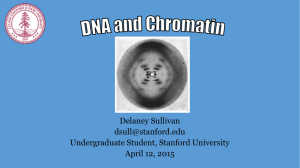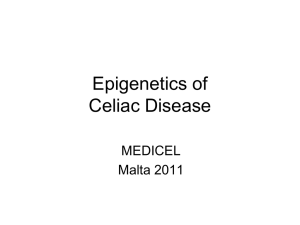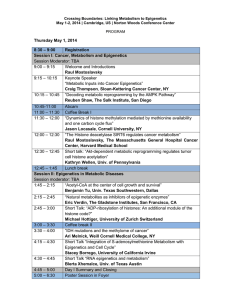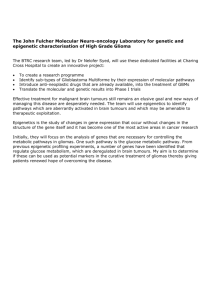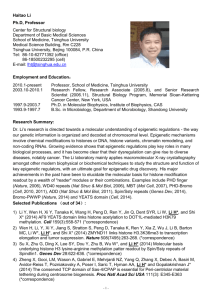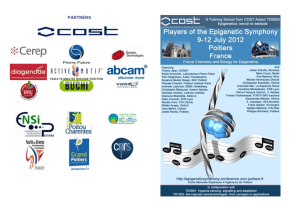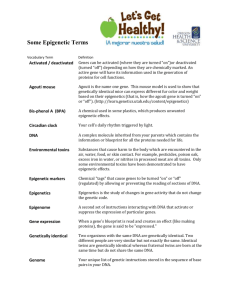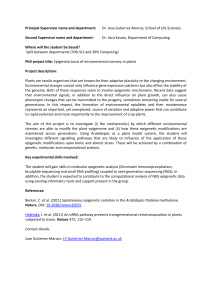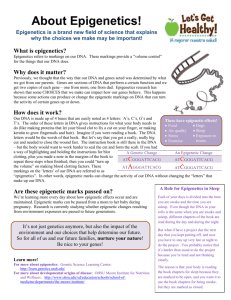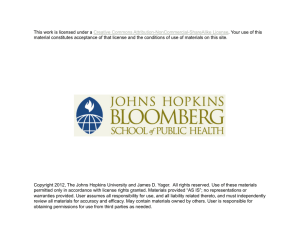Spring semester 2008
advertisement
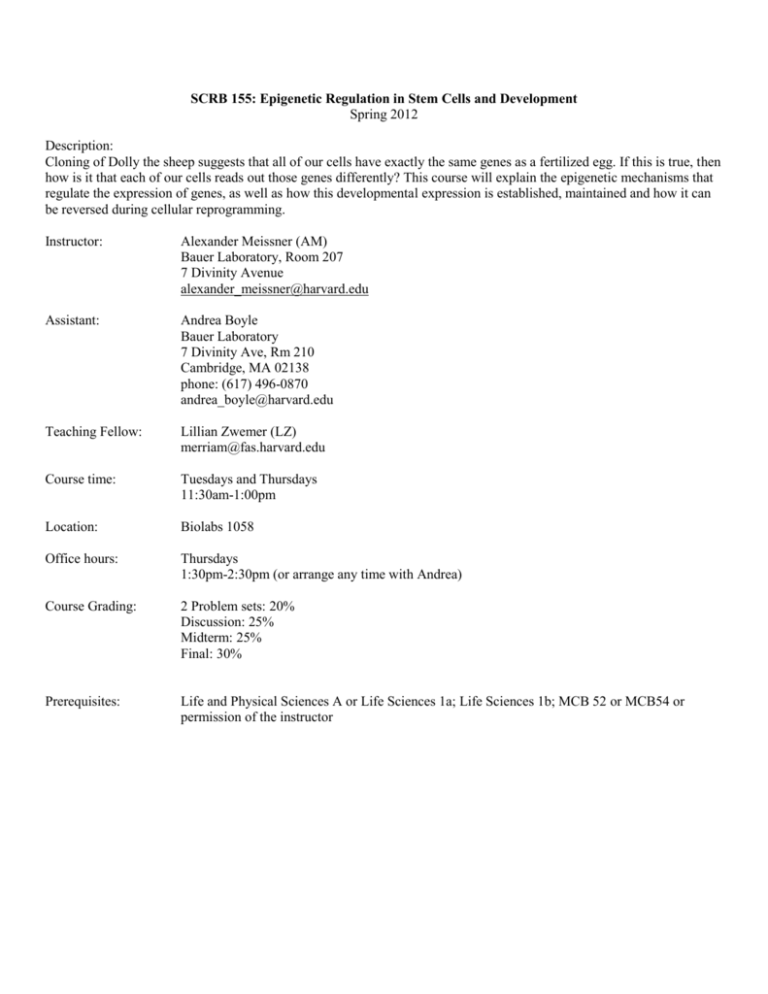
SCRB 155: Epigenetic Regulation in Stem Cells and Development Spring 2012 Description: Cloning of Dolly the sheep suggests that all of our cells have exactly the same genes as a fertilized egg. If this is true, then how is it that each of our cells reads out those genes differently? This course will explain the epigenetic mechanisms that regulate the expression of genes, as well as how this developmental expression is established, maintained and how it can be reversed during cellular reprogramming. Instructor: Alexander Meissner (AM) Bauer Laboratory, Room 207 7 Divinity Avenue alexander_meissner@harvard.edu Assistant: Andrea Boyle Bauer Laboratory 7 Divinity Ave, Rm 210 Cambridge, MA 02138 phone: (617) 496-0870 andrea_boyle@harvard.edu Teaching Fellow: Lillian Zwemer (LZ) merriam@fas.harvard.edu Course time: Tuesdays and Thursdays 11:30am-1:00pm Location: Biolabs 1058 Office hours: Thursdays 1:30pm-2:30pm (or arrange any time with Andrea) Course Grading: 2 Problem sets: 20% Discussion: 25% Midterm: 25% Final: 30% Prerequisites: Life and Physical Sciences A or Life Sciences 1a; Life Sciences 1b; MCB 52 or MCB54 or permission of the instructor Lecture Date Topic 1 1/24 (Tu) Lecture 1 (AM): Introduction to Epigenetics and SCRB155 Course overview; General introduction into epigenetics, epigenomics and epigenetic mechanisms including their role in development and disease; Stem cells and reprogramming 2 1/26 (Th) Lecture 2 (AM/LZ): Overview of class assignments, problem sets and discussion sections; introduction to presenting and discussing scientific papers Paper: Okano 1999 Cell 3 1/31 (Tu) Lecture 3 (AM): DNA Methylation-Part1 Introduction into DNA methylation, history, current understanding and genomic distribution as well as its establishment and maintenance 4 2/2 (Th) Paper Discussion (LZ/AM): Review: Bird 2002 Genes & Development Primary: Chen 2003 Molecular & Cellular Biology Primary: Athanasiadou 2010 PLoS One 5 2/7 (Tu) Lecture 4 (AM): DNA Methylation-Part2 /Histone Modifications-Part1 Sites of DNA methylation and mechanisms of demethylation; Hydroxymethylation (5-hmC); Introduction to histone modifications and the histone code 6 2/9 (Th) Paper Discussion (LZ/AM): Review: Branco 2012 Nature Reviews Genetics Primary: Gu. 2011 Nature Primary: Williams 2011 Nature 7 2/14 (Tu) Lecture 5 (AM): Histone Modifications-Part2 (1st Problem set due) The readers and writers; polycomb and trithorax; chromatin states 8 2/16 (Th) Paper Discussion (LZ/AM): Review: Prezioso 2011 FEBS Primary: Woo 2010 Cell Primary: Zhao 2010 Cell 9 2/21 (Tu) Lecture 6 (AM): Histone Variants and Nuclear Architecture Role and distribution of histone variants, higher order chromatin structure and nuclear architecture. 10 2/23 (Th) Midterm review session (LZ) 11 2/28 (Tu) Lecture 7 (guest lecture John Rinn): Non-Coding RNAs Non-coding RNAs emerged as important regulators and interactors with the epigenetic machinery in the past years. We will provide an overview of the field and summarize the latest advancements. Website: http://www.rinnlab.com/ 12 3/1 (Th) Midterm 13 3/6 (Tu) Lecture 8 (AM): Reading the Epigenome (Technologies) Introduction to next generation sequencing technologies and their applications for DNA methylation and chromatin mapping 14 3/8 (Th) Tour of the Sequencing Center at the Broad Institute of MIT and Harvard 3/10 – 3/18 Spring Break 15 3/20 (Tu) Lecture 9 (guest lecture Ben Ebert): Epigenetics in Human Disease-Part1 Examples of epigenetic diseases with a particular focus on cancer Website: http://ebertlab.bwh.harvard.edu/ 16 3/22 (Th) Paper Discussion (LZ): Review: Jones 2007 Cell Primary: Berman 2011 Nature Genetics 17 3/27 (Tu) Lecture 10 (AM): Epigenetics in Human Disease-Part2 (Environmental Epigenetics) Role of environmental influences on the epigenome including diet, aging and other exposures. 18 3/29 (Th) Paper Discussion (LZ/AM): Review: Kouzarides 2007 Cell Primary: Ernst 2011 Nature 19 4/3 (Tu) Lecture 11 (AM): Epigenetic Mechanisms in Development-Part1 Role of epigenetic modifications in early development; dynamic changes during differentiation; genomic imprinting; x-inactivation 20 4/5 (Th) Field trip to local Epigenetics Company (TBA) (2nd Problem set due) 21 4/10 (Tu) Lecture 12 (AM): Epigenetic Mechanisms in Development-Part2 Epigenetic mechanisms involved in adult development 22 4/12 (Th) Lecture 13 (AM): Epigenetics and Pluripotency Mouse and human ES cells; pluripotency and developmental plasticity 23 4/17 (Tu) Lecture 14 (AM): Epigenetic Reprogramming Mechanisms of cellular reprogramming including nuclear transfer and induced pluripotent stem (iPS) cells. 24 4/19 (Th) Paper Discussion (LZ/AM): Review: Plath 2011 Nature Reviews Genetics Primary: Koche 2011 Cell Stem Cell Primary: Takahashi 2006 Cell 25 4/24 (Tu) Finals review session Finals (TBA)
